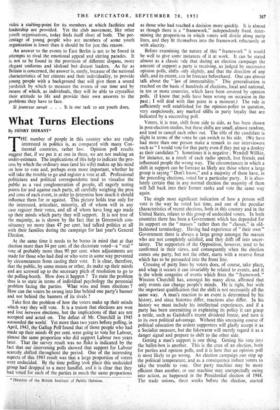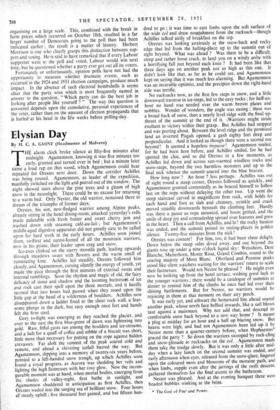What Turns Elections
By HENRY DURANT*
THE number of people in this country who are really interested in politics is, as compared with many Con- tinental countries, rather low. Opinion poll results suggest that, if we put it at one in three, we are not making an under-estimate. The implications of this help to indicate the pro- cess by which the ordinary man (and his wife) makes up his mind on how to vote and, perhaps even more important, whether he will take the trouble to go and register a vote at all. Professional politicians and political correspondents tend to visualise the public as a vast conglomeration of people, all eagerly noting points for and against each party, all carefully weighing the pros and cons of each event, in order to determine how much it should influence them for or against. This picture holds true only for the interested, articulate, minority, all of whom will in any case register their 'votes, and all of whom have long ago made up their minds which party they will support. It is not true of the majority, as is shown by the fact that in Greenwich con- stituency no more than 47 per cent. had talked politics at all with their families during the campaign for last year's General Election.
At the same time it needs to be borne in mind that at that election more than 84 per cent. of the electorate voted—a " real " vote of probably more than 90 per cent. when adjustments are made for those who had died or who were in some way prevented by circumstances from casting their vote. It is clear, therefore, that the public, by some means or other, do make up their minds and are screwed up to the necessary pitch of resolution to go to the polling-booth. How does it happen ? To state the problem thus is to state in terms of individual psychology the perennial ' problem facing the parties. What wins and loses elections ? How can the voters be swung into line behind one party's banner and not behind the banners of its rivals ?
Take first the problem of how the voters make up their minds which way they will vote. It is a truism that elections are won and lost between elections, but the implications of that- are not accepted and acted on. The defeat of Mr. Churchill in 1945 astounded the world.' Yet more than two years before polling, in April, 1943, the Gallup Poll' found that of those people who had made up their minds 48 per cent, were going to vote for Labour, almost the same proportion who did support Labour two years later. That the survey result was no fluke is indicated by the fact that our intervening polls showed that support for Labour scarcely shifted throughout the period. One of the interesting aspects of this 1943 result was that a large proportion of voters were undecided. By the time polling took place this undecided group had dropped to a mere handful, and it is clear that they had voted for each of the parties in much the same proportions
*Director of the British Institute of Public Opinion.
as those who had reached a decision more quickly. It is almost as though there is a "framework," independently fixed, deter- mining the proportions in which voters will divide along party lines, and they fit themselves into the framework reluctantly or with alacrity.
Before examining the nature of this "framework" it would be well to give some instances of it at work. It can be stated almost as a classic rule that during an election campaign the amount of support a party is receiving, as judged by successive opinion polls, shifts only slightly, and that the direction of any shift, and its extent, can be forecast beforehand. One can almost talk about the "law of immutability." This generalisation is reached on the basis of hundreds of elections, local and national, in ten or more countries, which have been covered by opinion polls. (I know that polls have been wrong on occasion in the past ; I will deal with that point in a moment.) The rule is sufficiently well established for the opinion-poller to question, very suspiciously, any marked shifts in party loyalty that are indicated by a succeeding poll.
Voters, it is true, shift from side to side, as has been shown In post-election studies, but these shifts are small, almost random, and tend to cancel each other out. The role of the candidate is slight in terms of the votes he can switch to his side. (We have had more than one person make a remark to our interviewers such as" I would vote for that party even if they put up a donkey as their candidate.") Sometimes it is negative' Wendell Willkie, for instance, as a result of each radio speech, lost friends and influenced people the wrong way. The circumstances in which a shift in support can be forecast as likely are those where a large group is saying "Don't know," and a majority of them have, in the preceding elections, voted for a particular party. It is abso- lutely certain that in any normal election the majority of them will fall back into their former ranks and vote the same way again.
The single most significant indication of how a person will vote is the way he voted last time, and one of the peculiar characteristics of recent elections, both in this country and in the United States, relates to this group of undecided voters. In both countries there has been a Government which has depended for its support on the " masses " rather than the "classes," in old- fashioned terminology. Having had experience of "their own" Government there is always a large group amongst the masses who are not completely satisfied, and they drift off into uncer- tainty. The supporters of the Opposition, however, tend to be confirmed in their views, and consequently when the election comes one party, but not the other, starts with a reserve force which has to be persuaded into the front line.
Crossing of party lines by voters does, of course, take place, and whe,p it occurs it can invariably be related to events, and it is the whole congeries of events which fixes the "framework." Winston Churchill has, amongst his many dicta, affirmed that only events can change people's minds. He is right, but with the important qualification that the shift is not necessarily all the same way. A man's reaction to an event is determined by his history, and since histories differ, reactions also differ. In his history we must include his intellectual experiences, and if a party has been unremitting in explaining its policy it can grasp a nettle, such as Gaitskell's recent dividend freeze, and turn it to its own political advantage. Without this unceasing course of political education the ardent supporters will gladly accept it as a Socialist measure, but the lukewarm will merely regard it as a danger signal and prepare to shift to the other side.
Getting a man's support is one thing. Getting his vote into the ballot-box is another. This is the crux of an election, both for parties and opinion polls, and it is here that an opinion poll is most likely to go wrong. An election campaign can step up the political temperature, and as a consequence induce voters to take the trouble to vote. One party machine may be more efficient than another, or one machine may unexpectedly swing into action, as happened in the Presidential election of 1948. The trade unions, three weeks before the election, started organising on a large scale. This, combined with the break in farm prices which occurred on \October 18th, resulted in a far larger number of Democrats going to the poll than had been indicated earlier ; the result is a matter of history. Herbert Morrison is one who clearly grasps this distinction between sup- port and voting. He is sdid to have remarked that if every Labour supporter went to the poll and voted, Labour would win next time, but he questioned whether a party ever got out all its voters.
Fortunately or unfortunately, opinion polls have not had the opportunity to measure whether dramatic events, such as occurred in the 1924 and 1931 election campaigns, produce much impact. In the absence of such electoral bombshells it seems clear that the party wins which is most frequently named in answer to the question, "Which party can do the best job in looking after people like yourself ? " The way this question is answered depends upon the cumulative, personal experiences of the voter, rather than on the amount of election propaganda that is hurled at his head in the flw weeks before polling-day.



































 Previous page
Previous page